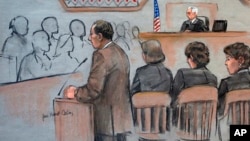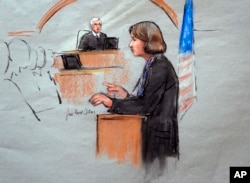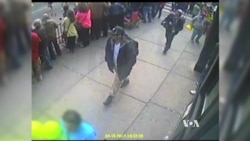The defense lawyer for suspected Boston Marathon bomber Dzhokhar Tsarnaev told the jury at his trial Wednesday that he helped carry out the deadly 2013 attack, but contended that Tsarnaev's older brother was the mastermind behind the plot.
"It was him," attorney Judy Clarke said of her client, who is facing the death penalty if convicted of setting off a pair of homemade pressure-cooker bombs, packed with nails and ball bearings, at the finish line of the annual race in 2013 that killed three people and injured another 264.
Tsarnaev has pleaded not guilty to the 30 counts against him, including the fatal shooting of a Massachusetts Institute of Technology police officer days after the bombings as the Tsarnaevs tried to flee.
Clarke, one of the U.S.'s foremost death penalty legal specialists, told jurors on the first day of the trial the defense will not "sidestep" Tsarnaev's guilt.
Influence of older brother
But she claimed that he was deeply influenced by his older brother, Tamerlan Tsarnaev, 26, to carry out the attack, which a prosecutor alleged was aimed at avenging U.S. wars in Muslim countries.
Dzhokhar Tsarnaev inadvertently killed his brother, running over him with a car, as they attempted to elude police days after authorities had identified them as suspects in the bombings.
"It was Tamerlan Tsarnaev who self-radicalized," Clarke said. "It was Dzhokhar who followed him. The evidence will show that Tamerlan planned and orchestrated and enlisted his brother into this series of horrific acts."
In blaming the older brother, Clarke's strategy appeared aimed at sparing the 21-year-old Dzhokhar Tsarnaev from the death penalty. If Tsarnaev is convicted, the jury will decide whether he is executed or gets life in prison without the possibility of parole.
The approach set up an immediate conflict with U.S. District Judge George O'Toole, who had ruled that the question of the relative culpability of the two brothers was best left to the trial's second phase, once Dzhokhar's guilt has been established.
“Some evidence of the brother's interactions will be inevitable,” O'Toole allowed in brief remarks before the trial opened. But he interrupted Clarke multiple times to warn her against going too deep into family history.
Defense lawyers had fought up to the last minute to have the trial moved out of Massachusetts, arguing the emotional impact of the bombings ran too deep and too many people had personal connections to the case. Their requests were rejected by O'Toole and a federal appeals court.
Prosecutors lay out case
In his opening statement, U.S. prosecutor William Weinreb accused the younger Tsarnaev of detonating bombs designed to "tear people apart and create a bloody spectacle."
Weinreb described the two homemade pressure cooker bombs used in the attack as the type "favored by terrorists" because of the mayhem and injuries they could cause. After the blasts, he said, "The air was filled with the smell of burning sulfur and people's screams."
Watch video from VOA's Carolyn Presutti:
The prosecutor said Dzhokhar Tsarnaev "believed that he was a soldier in a holy war against Americans." Weinreb said Tsarnaev "also believed that by winning that victory, he had taken a step toward reaching paradise. That was his motive for committing these crimes."
The shaggy-haired Tsarnaev stared straight ahead, avoiding looking at the jury, as the prosecutor spoke.
Victims at trial
More than 20 victims of the blasts watched the early moments of the trial, taking up the entire left-hand side of the courtroom.
Two dramatically different portraits of the former college student are expected to emerge during the trial.
Was he a submissive, adoring younger brother who only followed directions given by his older, radicalized brother? Or was he a willing, active participant in the attacks?
The brothers are ethnic Chechens who had lived in the former Soviet republic of Kyrgyzstan and the volatile Dagestan region of Russia before coming to the U.S. with their parents and two sisters about a decade before the bombings.
Some material for this report came from Reuters and AP.








